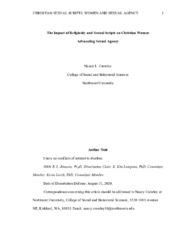The Impact of Religiosity and Sexual Scripts on Christian Women Advocating Sexual Agency
View/
Date
August 31, 2020Author
Crowley, Nancy L.
Advisor
Johnson, Nicole
Metadata
Show full item recordAbstract
Research supports the correlation between increased sexual satisfaction and increased marital satisfaction. After examining previous research on the sexual satisfaction levels of highly religious women, there was a correlation between high religiosity scores and lower sexual satisfaction levels. This led to the question, "Do Christian married women advocate for their sexual agency (sexual needs, sexual desires, mutuality of expression) within their marriage relationships?" This study examined several influencing factors, current religious constructs, early experiences, and family-of origin (FOO) influences, to further clinical understanding for Christian women engaged in therapy. Data were collected through social media and snowball recruiting methods to reach the largest audience for data collection. To analyze data, a quantitative research method was used, implementing three self-reporting measures to collect data: Centrality of Religion (CRS), Sexual Satisfaction Survey for Women (SSS-W), and Sexual Assertiveness Scores (SAQ). Inclusion criteria for the study were married, Christian women. The research outcomes were mixed. Baptist and nondenominations scored high on the CRS, yet scores for SSS-W and SAQ were average, in that they did not show any significant difference. Other major findings were among the youngest cohort that scored significantly higher on the SAQ than the other cohorts and correlated with lower CRS scores. This result was predicted, yet other scores (SSS-W) did not show any significant difference among the younger cohort. Recommendations for further studies exploring possible social and behavioral and cultural factors influencing the younger cohort are presented.
Original item type
PDF
Original extent
108 pages
Collections
Copyright
This original work is protected by copyright. Copyright is retained by the author(s). Works may be viewed, downloaded, or printed, but not reproduced or distributed without author(s) permission.


 Maintained by the Northwest University Library
Maintained by the Northwest University Library